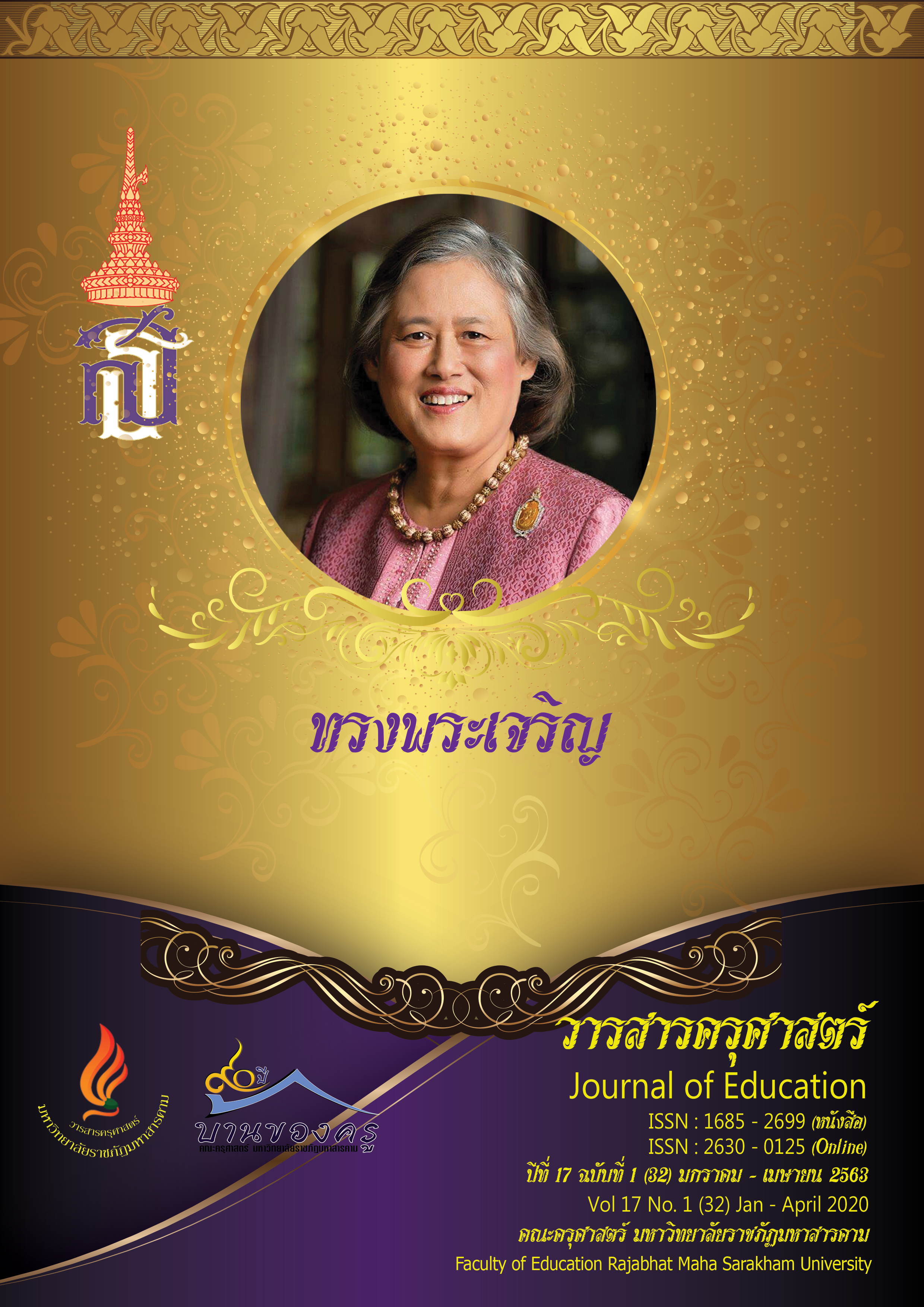Learning Management for Enhancing Critical Thinking Ability and Habits of Mind for Undergraduate Students at the Faculty of Education,Chandrakasem Rajabhat University
Main Article Content
Abstract
The purposes of this research were: 1. to develop a learning management process, and
2. to study the results of learning management for enhancing critical thinking ability and habits of
mind through research and development was applied for this research. The samples were 2 groups
of undergraduate students, 28 students in each group at the Faculty of Education which were
clustered random sampling from students who were registered in the Educational Philosophy
course in the first semester of the academic year 2018. The samples then divided into two groups
and randomly assigned to an experimental group and controlled group. The research instruments
were 1) learning management plans, 2) critical thinking ability test, 3) habits of mind test and
4) satisfaction questionnaire. The data were analyzed by mean, standard deviation and t-test.
The research revealed that 1) The process of learning management for enhancing critical
thinking ability and habits of mind developed by researcher comprised of five steps: (1) review
previous knowledge and identify issues for thinking, (2) search for new knowledge and analyze the
data, (3) try to understanding data, new knowledge and evaluate the precision of the data, (4) share
and organize knowledge and (5) present the products and apply knowledge. 2) The results of the
learning management were the critical thinking ability and habits of mind of students in the
experimental group were statistically higher than the students in a controlled group and higher than
before at 0.05 level of significance. And 3) the satisfaction of the students in the experimental group
on the learning management process overall was at a high level.
Article Details
ข้อกำหนดเบื้องต้นที่ผู้นิพนธ์(ผู้ส่งบทความ) ควรทราบ
1. ผู้นิพนธ์ที่ประสงค์จะลงตีพิมพ์บทความกับวารสาร ตั้งแต่เดือนมกราคม 2563 เป็นต้นไป ให้ใช้รูปแบบใหม่ (Template 2563) โดยสามารถดูตัวอย่างได้ที่เมนู GUIDELINES
2. จะตีพิมพ์และเผยแพร่ได้ ต้องผ่านการประเมินจากผู้ทรงคุณวุฒิ (Peer Review)
3. การประเมินบทความโดยผู้ทรงคุณวุฒิ (Peer Review) เป็นแบบ Double Blind
4. การอ้างอิงบทความใช้หลักเกณฑ์ APA (American Psychological Association) คลิก
5. บทความถูกปฏิเสธการตีพิมพ์ ไม่ผ่านการประเมิน ผู้นิพนธ์ขอยกเลิกเองหรือชำระเงินก่อนได้รับการอนุมัติ ทางวารสารไม่มีนโยบายการคืนเงิน
References
ชมนาด เชื้อสุวรรณทวี. (2555) การพัฒนารูปแบบการเรียนการสอนคณิตศาสตร์เพื่อส่งเสริมความสามารถในการคิดขั้นสูงและจิตตนิสัยของนักเรียนระดับมัธยมศึกษา (วิทยานิพนธ์ปริญญาปรัชญาดุษฎีบัณฑิต).มหาวิทยาลัยศิลปากร, นครปฐม.
ทิศนา แขมมณี. (2557). ศาสตร์การสอน : องค์ความรู้เพื่อการจัดกระบวนการเรียนรู้ที่มีประสิทธิภาพ(พิมพ์ครั้งที่ 17). กรุงเทพมหานคร: สำนักพิมพ์แห่งจุฬาลงกรณ์มหาวิทยาลัย.
ไพศาล วรคำ. (2558). การวิจัยทางการศึกษา (พิมพ์ครั้งที่ 7). มหาสารคาม: ตักสิลาการพิมพ์.
ไสว ฟักขาว. (2561). การจัดการเรียนรู้เพื่อส่งเสริมทักษะในศตวรรษที่ 21. กรุงเทพมหานคร: มหาวิทยาลัยราชภัฏจันทรเกษม.
สมนึก ภัททิยธนี. (2553). การวัดผลการศึกษา (พิมพ์ครั้งที่ 7). กาฬสินธุ์: โรงพิมพ์ประสานการพิมพ์.
อุษา ปราบหงส์. (2550). การพัฒนาทักษะการคิดอย่างมีวิจารณญาณในรายวิชาพฤติกรรมมนุษย์กับการพัฒนาตนสำหรับนักศึกษามหาวิทยาลัยราชภัฏสกลนคร (วิทยานิพนธ์ปริญญาครุศาสตรดุษฎีบัณฑิต).มหาวิทยาลัยราชภัฏสกลนคร, สกลนคร.
Costa, A., and Kallick, B. (2009). Habits of mind across the curriculum: Practical and creativestrategies for teacher. USA: Alexandria.
Ennis, R. H., and Millman, J. (1985). Cornell critical thinking test, level Z. Pacific Grove, CA:Midwest Publications.
Facione, P. A. (2011). Critical thinking: What it is and why it counts. Measured Reasons and theCalifornia Academic Press, Milibrae CA. 2013. 1-28.
Suad, A., Haya, A., Asma, A., Haila, A., and Nidhal, A. (2018). A systematic review: Using habits of mind to improve student’s thinking in class. Higher Education Studies, 8(1), 25-32.


